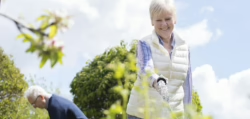
There’s a lot to think about when someone considers moving in with family or giving money to help build a granny flat or home extension. For older Australians, these decisions often involve a deep mix of personal, financial, and practical factors – but the outcomes can affect Age Pension entitlements in ways that aren’t always obvious.
Centrelink calls these arrangements ‘granny flat interests’ – not because of the building itself, but because of the legal and financial interest created when you exchange money, assets, or ownership rights for a place to live for life.
This article unpacks some of the most important considerations – from gifting rules to homeowner status, and highlights the value of getting the right advice before going ahead.
Top Six Frequently Asked Questions:
1. What is a granny flat interest?
It’s not the building – it’s the agreement. Centrelink defines a granny flat interest as an agreement of accommodation for life. It may be created by transferring money, a share of a property, or the title of your home in exchange for this right.
2. When is gifting a problem – and when is it not?
Centrelink’s rules on gifting (or ‘deprivation’) are triggered when you give away assets without receiving adequate value or consideration in return. But when you create a granny flat interest and receive the lifetime right to live in a home, that can be considered adequate value as long as it passes what’s called the ‘reasonableness’ test.
3. What’s the ‘reasonableness’ test?
Centrelink calculates what they consider to be the reasonable value of a life interest based on your age and the Age Pension rate. If you pay more than this amount (say, by transferring property or large sums of money), the excess may be treated as a gift – which could mean a reduction in your Age Pension for five years.
4. Will I still be a homeowner?
It depends on how much you’ve contributed. Centrelink compares your entry contribution to the ‘extra allowable amount’, currently $258,000. If your contribution is less than this, you may be treated as a non-homeowner. If it’s more, you’re considered a homeowner, and the contribution is exempt from the asset test.
5. What happens if the arrangement breaks down?
Things don’t always go to plan. If you leave the property within five years for a reason that was foreseeable such as relationship breakdown or family conflict, Centrelink may apply gifting rules retrospectively. This can potentially also affect Age Care arrangements and means testing. That’s why it’s so important to document the arrangement carefully and seek advice before making any big changes.
6. What if the property is sold?
The person you’ve created the arrangement with can’t just take your interest away. If the property is sold, they must either:
- Sell it with your lifetime right as a condition of the sale
- Transfer your interest to a new property
- Or provide a refund or other compensation in return for ending the arrangement
7. Who needs to be involved?
Granny flat decisions don’t happen in isolation – they often sit at the crossroads of financial, legal, and family considerations. A financial adviser can help explain how an arrangement might affect your Age Pension, especially when rules around homeowner status, gifting, or superannuation come into play.
Legal advice is equally important, particularly if property is changing hands or you’re relying upon informal family understandings. Making sure the arrangement is documented clearly can help protect everyone’s interests and avoid complications down the track.
If property or large sums of money are involved, it’s wise to get tax advice. Since 1 July 2021, granny flat arrangements can be exempt from Capital Gains Tax (CGT) if they are properly documented as personal agreements. To qualify, the person living in the granny flat must be of Age Pension age or have a disability requiring ongoing care.
Real world scenarios:
How granny flat decisions play out in practice
Granny flat arrangements can take many forms depending on your goals, stage of life, and family dynamics. Here are a few ‘real-world’ examples from recent Retirement Advice Consultations – each one highlighting the different factors people weigh when considering a move, a financial gift, or a shared living arrangement.
Miriam: Clarifying trust ownership and Age Pension status
Miriam reached out while reviewing her financial situation in retirement. She lives in a home owned by her family trust, where she holds control as the Appointor. Although she doesn’t own the home in her personal name, we discussed how Centrelink may still assess her as a homeowner because she has both control of the trust and benefits from a secure right to live in the property.
Miriam was also considering giving her daughter a significant sum in exchange for a lifetime right to live in a separate part of a new home, raising the possibility of creating a granny flat interest. We explored how this might shift her assessment to non-homeowner status, potentially increasing her Age Pension. The discussion highlighted how important it is to understand the interaction between Centrelink’s rules on trusts, gifting, and accommodation rights, as well as the value of getting legal and tax advice before making changes.
Dennis: Supporting his son, but staying Age Pension-eligible
Dennis was considering helping his adult son purchase a property in another state. He planned to contribute a large sum and retain a lifetime right to live there. But because the title would be in his son’s name, the arrangement raised complex issues about gifting and whether Centrelink would consider the contribution as exceeding the ‘reasonable value’ of a granny flat interest. The reasonableness test became central to the discussion—along with how to evidence Dennis’s right to live there to satisfy Centrelink requirements.
Elaine: Wanting to give, but not lose benefits
Elaine had recently sold her home and was thinking about giving some of the proceeds to her daughter, who has offered to renovate a space for her to live in. During our conversation, we covered how the funds would be assessed under the gifting rules, and how a formal granny flat arrangement might avoid unintended Age Pension impacts. By walking through Centrelink’s approach to these agreements, she felt more confident deciding whether to proceed – and how to structure it.
Retirement Essentials’ strategy consultations guided by fully qualified and experienced advisers can help you explore your options and consider the Age Pension and superannuation consequences for your key retirement decisions.
Here are some conversation starters for you to ponder:
- We’ve been talking about helping Mum move in and maybe building a small unit out the back..What should we be thinking about before we make any commitments?
- If I give my son money to renovate and then move in with him, will that affect my Age Pension?






Your article implies that Centreink applies the ‘test of reasonableness’ whenever they assess a granny flat interest.
That is incorrect.
The Guide to Social Security Law states ‘the value of a granny flat interest is GENERALLY the same as the amount paid for the interest. This means there is NO deprivation amount.’
In particular cases, where there is a special reason, the granny flat interest may be valued at a DIFFERENT amount than the amount paid. These cases are the EXCEPTION to the rule, and this different amount is called the test of reasonableness.’
To anyone considering setting up a granny flat interest, then Guide 4.6.4.50 should be compulsory reading. The guide gives 3 clear examples where the value of the granny flat interest is the amount paid. It also provides 3 exceptions where the test of reasonableness is used.
If in any doubt, call Centrelink’s Financial Information Service on 132300.
Hi James, thank you for your comment. You are spot on regarding article 4.6.4.50 of the Social Security Law (SSL) Guide being the ultimate source of truth. We have found that it is not as easy to read and understand for everyone as we would hope though which is why we try to simplify it in articles such as this. Also, from our experience, many of the scenarios listed in that SSL article as examples of when the reasonableness test is applied are what our members commonly partake in. This is why rather then trying to articulate when it does/doesn’t apply we felt it better to explain what it is because even those it does not apply may hear about it and wonder if/how it impacts them. Thank you again for your comment, great to see someone so well versed in the SSL!
Thanks for the response Steve. Very interesting to hear what is actually happening in the marketplace.
Another thought for discussion – should the government change their concessions for granny flat agreements?
Taking example 1 in guide 4.6.4.50, a couple could transfer the title to their principal home in return for a life interest (hopefully in writing), and no deprivation would be assessed. Their home could be worth $1, $2 $3million or more. No deprivation. This may result in fewer assessable assets if they enter an aged care facility. (Note there are special rules if they vacate the granny flat interest within 5 years. see Guide 4.6.4.70).
Is this too generous?
Hi James, I’m afraid you have me out-gunned on this one. There are so many factors to take into account when it comes to why the Social Security Laws are what they are that I’m happy to just understand them as is and leave it at that.
Do you have an information sheet on downsizing?
We will miss out on the 10 year rule but require information on timing of selling and buying time spans if we choose to lease whilst finding the right new home for us, as we don’t want to buy before selling.
Hi John, the best way for us to assist you further regarding downsizing rules and how they pertain to your specific situation would be via our Retirement Advice Consultation which you can book HERE.